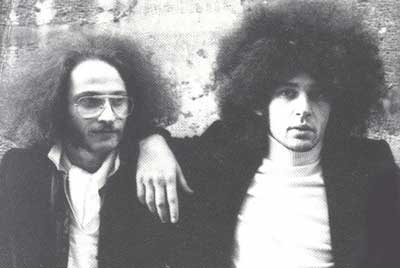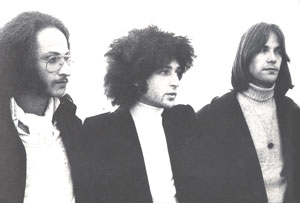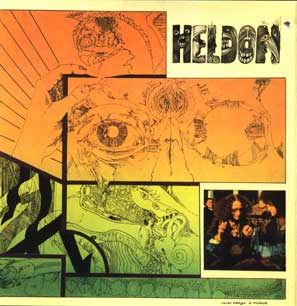|
IS HELDON FRENCH FOR
"INCREDIBLE HAIR"? In
my unending and downright obsessive quest to hear all good
music, I've even come across a band like Heldon. Who in
the Sam Hill is Heldon??, I can hear you asking right now.
Well, they're a French space rock/prog band whose prime
years were 1974-1977 or thereabouts. For most intents and
purposes, Heldon was/is one man, Richard Pinhas, a Parisian
guitarist, synth-player, sci-fi maniac, Robert Fripp worshipper,
and one-time possessor of perhaps the most incredible Caucasian
afro of all time. Some of their albums come highly recommended from Forced
Exposure, and the "avant" shelf at the co-op radio station
I volunteer at has all kinds of releases by Heldon, and
solo releases by their leader Richard Pinhas, along with
all sorts of other prog/space dreck also released by the
Cuneiform label. (The Cuneiform label is a weird one - there
are definitely some great releases in their catalog, but
you have to have your "prog/space dreck" meter on at ALL
TIMES - you never know when a lame title is going to hit,
because the covers all look the same….)
Some of their albums come highly recommended from Forced
Exposure, and the "avant" shelf at the co-op radio station
I volunteer at has all kinds of releases by Heldon, and
solo releases by their leader Richard Pinhas, along with
all sorts of other prog/space dreck also released by the
Cuneiform label. (The Cuneiform label is a weird one - there
are definitely some great releases in their catalog, but
you have to have your "prog/space dreck" meter on at ALL
TIMES - you never know when a lame title is going to hit,
because the covers all look the same….)
Anyway,
just last night I borrowed the first three Heldon albums,
my introduction to this group that has been called "the
most important prog rock group from France." For some
reason the first and the third are on one two-disc set,
while the second has its own release. You know, this really
isn't my kind of music, but at the same time it's not too
bad. It's about the best use of 'cheesy' synthesizer tones
you're gonna come across, right up there with the Mother
Mallard's Portable Masterpiece Co. CD (also on Cuneiform!)…in
fact, the track "Moebius" on Heldon II: Allez Teia
sounds a lot like Mother Mallard's, although it's less than
two minutes long. However, Heldon's cheese-tones just can't
compare with the groups that probably directly influenced
them, like Cluster, Harmonia, Tangerine Dream, Popol Vuh,
and early Kraftwerk. These groups took cheesy antique synthesizer
sounds and somehow literally strained all of the cheese
out of them, creating lean and mean classics of electronic
space rock. Of course, they were from Germany, and something
very magick was happening there that just didn't seem to
migrate to anywhere else in the world (and especially not
France).
Woh,
hold up, I just can't believe I'm writing an article about
"French space/prog"! It's amazing! French music in general….I
was just in Paris, and as lovely as the city was, while
I was walking around I started to get a distinct impression
that nobody in the entire city cared about music at all….sure,
they listened to it, and there were junky CD stores everywhere
filled to the brim with all sorts of international pop discotheque
music, and there were street musicians wearing berets playing
maudlin tunes on accordions, but I got the sense that music
just wasn't important there. Of course I was just in the
wrong neighborhoods because I didn't know the right people,
because there's an exciting underground in France just like
there's an exciting underground EVERYWHERE. (All you need
is a shovel and a stethoscope.) After all, one of the finest
CDs of 1999, Tony Allen's Black Voices, was produced
in Paris. And one of the greatest jazz drummers of all time,
Sunny Murray, has lived in Paris for years. But in some
'hoods, like the East Village in NYC, or the Berlin Mitte,
or Chicago's Wicker Park, the streets just brim and vibrate
with music, and around every corner you can hear something
interesting or see an interesting storefront to wander into.
In Paris, everything was brimming and vibrating, sure, but
as far as music specifically, it all seemed to be about
international pop discotheque fashion-model fluff. And damn,
the locals in Paris really are rude when it comes to English-speaking
hicks, even the polite ones like my wife and I....
Tangent
finished. These Heldon albums are all right. The main reason
I wanted to write this piece was to show off Richard Pinhas's
afro, which I have done. However,  I
will discuss some of the better tracks on these three records….like
this one here, track five on Allez Teia, with the
excellent title "Fluence a) Continuum Mobile b) Disjonction
Inclusive." This is a long 12-minute track made up of several
tracks of cheesy synth tones that pulse and tickle and wind
all in and out of themselves. A pulse-density is built up,
not exactly asserting itself, but there like a rock,
like
Phillip Glass but more ambling, more laid-back, more like
Mother Mallard's (if not quite Terry Riley)….still, 'bad-asses'
like 'myself' still may find themselves wincing a bit….these
tones truly are CHEESY. The next track, "St-Mikael Samstag
Am Abends" uses cheese-tone to create a somewhat darker
mood -- when dusted guitar arpeggios come in near the 3-minute
mark it's pretty nice. Still, Heldon II is a rather bucolic
and rustic sounding album, pretty in the way that a lot
of mid-period Popol Vuh is pretty, which makes the 'urban
revolt' imagery on the cover rather ironic. Hell, you want
bucolic and rustic, the last track, "Michel Ettori," is
four minutes of just two acoustic guitars playing pretty
chord-and-solo stuff. It would sound lame on an album by,
say, Six Organs of Admittance, but here it's a nice contrasting
closer. Not a bad album, really, not bad at all. Actually,
I've got it on repeat in my CD player and it's played about
five times in a row now. And I still don't want to take
it off. Those cheesy synth tones and fat overdriven electric
guitar solos are starting to feel like warm blankets, and
it's pretty damn cold outside (November in Nebraska can
be a bitch). Now, I'm back on track one, which is actually
called "In The Wake Of King Fripp"! Pinhas thanks Robert
Fripp on almost every album; he's not shy about wearing
his influences on his (record) sleeve. The sound of the
track is indeed very No Pussyfooting, with pretty
phase-tone guitar arpeggios, pretty synth washes, and pretty
melodic-phat guitar soloing. I
will discuss some of the better tracks on these three records….like
this one here, track five on Allez Teia, with the
excellent title "Fluence a) Continuum Mobile b) Disjonction
Inclusive." This is a long 12-minute track made up of several
tracks of cheesy synth tones that pulse and tickle and wind
all in and out of themselves. A pulse-density is built up,
not exactly asserting itself, but there like a rock,
like
Phillip Glass but more ambling, more laid-back, more like
Mother Mallard's (if not quite Terry Riley)….still, 'bad-asses'
like 'myself' still may find themselves wincing a bit….these
tones truly are CHEESY. The next track, "St-Mikael Samstag
Am Abends" uses cheese-tone to create a somewhat darker
mood -- when dusted guitar arpeggios come in near the 3-minute
mark it's pretty nice. Still, Heldon II is a rather bucolic
and rustic sounding album, pretty in the way that a lot
of mid-period Popol Vuh is pretty, which makes the 'urban
revolt' imagery on the cover rather ironic. Hell, you want
bucolic and rustic, the last track, "Michel Ettori," is
four minutes of just two acoustic guitars playing pretty
chord-and-solo stuff. It would sound lame on an album by,
say, Six Organs of Admittance, but here it's a nice contrasting
closer. Not a bad album, really, not bad at all. Actually,
I've got it on repeat in my CD player and it's played about
five times in a row now. And I still don't want to take
it off. Those cheesy synth tones and fat overdriven electric
guitar solos are starting to feel like warm blankets, and
it's pretty damn cold outside (November in Nebraska can
be a bitch). Now, I'm back on track one, which is actually
called "In The Wake Of King Fripp"! Pinhas thanks Robert
Fripp on almost every album; he's not shy about wearing
his influences on his (record) sleeve. The sound of the
track is indeed very No Pussyfooting, with pretty
phase-tone guitar arpeggios, pretty synth washes, and pretty
melodic-phat guitar soloing.
Another
thing
besides the incredible hair
that elevates Heldon beyond prog/space typicalities is a
cool literary sci-fi wrinkle running throughout. Pinhas
doesn't just thank his guitar heroes in the liner notes,
he also thanks Philip K. Dick, and the third album closes
with a 17-minute track named after the Dick novel Doctor
Bloodmoney. What's more, the name Heldon itself is taken
from a Norman Spinrad novel (so no, it's not French for
"incredible hair"), and just recently Spinrad
has actually been collaborating with the group. (See the
official Pinhas/Heldon website for more on this…) Pinhas's
home studio is called "Schizo Studios," and the I/III
reissue has credits for "Stage management," "Gou-roux
management," "Dope management," "Love management," and "Psy
management"! And check out the album covers -- wouldn't
look out of place on a DAW paperback -- Psy Phi indeed!
What about those
other two Heldon albums I borrowed? Well, it took me quite
a while to get Allez Teia out of the CD player, but
I finally did and managed to spin the others....and they're
good too. Maybe a little more
primitive and
harder-edged
than Allez Teia -- both are primarily solo works
by Pinhas where Allez Teia is credited to the duo
of Pinhas and Grunblatt. More drug references on the third
album ("It's Always Rock'n'Roll") with
titles like "Cocaine Blues" (a killer nine minutes
of foreboding pulse-tickle that has no trace of the old
12-bar blues progression but is certainly as dark as a lot
of old blues music) and "Cotes de Cachalot ala Psylocybine"
(a great restrained undercurrent of synth pulse with the
usual Frippadelic guitar soloing coming in after a while).
Rather lovely artwork by one Géniaux de Meguet, probably
from the first album, as pictured.  And
about that "home studio" thing as mentioned before
-- at some point during the eighteen-minute "Aurore,"
the close listener can hear a dog wailing away And
about that "home studio" thing as mentioned before
-- at some point during the eighteen-minute "Aurore,"
the close listener can hear a dog wailing away
in the next room. Well, the Cunieform reissue does have
this note on the inner sleeve: "Electronique Gorilla
and 'It's Only Rock'n'Roll'
were originally recorded on home equipment. While we have
taken every step to insure that this CD will sound as good
as possible, defects on the master tape, such as distortion
& hiss, are audible." Well hell baby I'll take
a little bit of distortion & hiss if it means I might
have a chance to hear a real live dog barking in the background
of one of the songs...
.....Okay now
it's over a week later and I've borrowed some more stuff,
notably Heldon 6: Interface from 1977. This might
be my favorite Heldon LP yet....judging from the inner sleeve
photo, Pinhas has adopted a Neal Schon/Neal Geraldo/Loverboy
look (complete with athletic headband!), but fortunately
the music has developed inversely to that, getting meaner
and more punk-rock. Now Heldon are a full-time trio; Pinhas
and Patrick Gauthier build up the trademark moog/guitar
interlocking electro-pulse fields, while François
Auger comes in and out of the drones with live drums. His
approach sounds raw and improvisational, and when he kicks
into a Bonham-esque beat, all kinds of jagged rhythms start
baring their teeth from within the drone. On "Bal-A-Fou,"
this electro-stew almost has a lilting 'world music' feel,
while on the 19-minute title track they go through all kinds
of permutations of the electro-drone, imbuing its robotic
precision with a jam-band's sense of flow. Still no vocals!
And, the greatest sci-fi Heldon cover of all, looking like
a still from some Kubrick-directed cross between Barbarella
and THX-1138.
So I've
grown to kinda love these guys...the earlier albums, even
with their cheese-tones, still create such a pleasant field
of pulse-tickle that I just tend to leave 'em in the CD
player on repeat. And the dense punk trance-grooves of Interface
represent a whole new variation on drone-rock. The solo
CD by Richard Pinhas that I borrowed, East/West, is in fact
too cheesy, but Heldon transcended cheese beautifully. My
first beloved French band!
|
